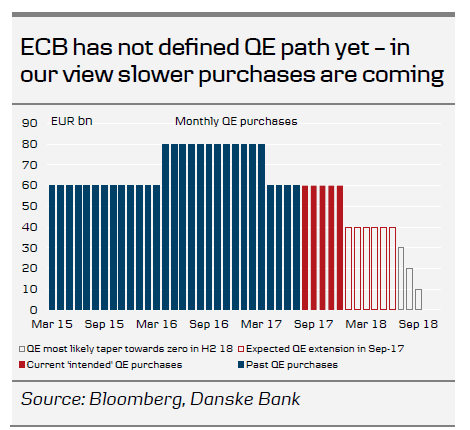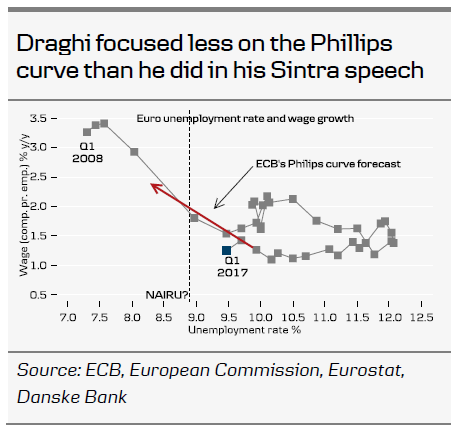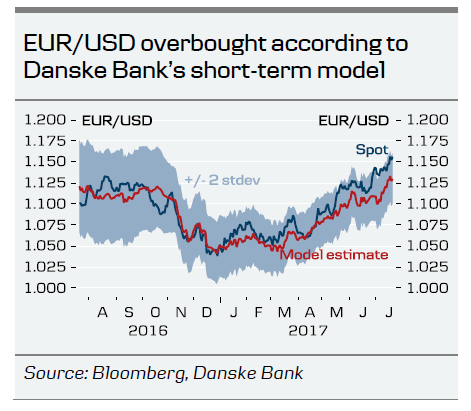The ECB kept unchanged policy rates, its QE programme, its forward guidance and QE easing bias. Hence, the ECB is still signalling its readiness to increase the size and/or duration of the QE purchases. The unchanged QE easing bias was perceived as dovish, as 47% of economists in a Bloomberg survey had expected the ECB to remove the reference to its readiness to increasing the size of the QE programme.
According to President Mario Draghi, the Governing Council was unanimous in setting no precise date for when to discuss changes to the QE programme but argued ‘our discussion should take place in the autumn’. Additionally, Draghi said the ECB has not tasked its staff to look into QE options after December 2017. This suggests the ECB is not ready to make an announcement at the September meeting on how QE purchases will continue next year. We maintain our view that the ECB will continue its QE purchases but at a reduced pace of EUR40bn per month in H1 18 and now believe this will be announced at the October meeting (previously September).
Today’s decisions from the ECB reflect its increased focus on the inflation outlook versus the economic recovery compared with what was communicated in Draghi’s speech at the ECB forum in Sintra. First, Draghi did not repeat that in a situation where the economy continues to recover, a monetary policy tightening could be needed in order to keep the policy stance ‘broadly unchanged’. Second, he reiterated that higher inflation is conditional on the monetary stimulus and that the ECB needs to be ‘persistent and patient and prudent’.
On a more hawkish note, Draghi argued the financing conditions remain broadly supportive. This judgement was based on yields being low by historical standards, sovereign and corporate spreads being tighter and bank lending rates being at very supportive levels dominating the repricing of the exchange rate, which had received some attention among ECB members. That said, the ECB still has an eye on the conditions, as Draghi said a financial tightening was ‘the last thing’ the ECB needs.
It will be very interesting to see whether Draghi’s main focus will be on his belief in the Phillips curve (i.e. the economic recovery will eventually lift wage inflation) at Jackson Hole when he is together with other global central bank governors. Given today’s communication, this seems less likely, as he argued the ECB is waiting for more information (including the updated projections in September) but this could change ahead of Jackson Hole.
The euro generally gained during Draghi’s press conference and EUR/USD still trades in overbought territory, in our view. Hence, we see risks skewed on the downside in the near term. In particular, we note that EUR/USD price actions contrast with European fixed income markets, where, for example, 2Y EUR swap interest rates fell back after the press conference, while EUR/USD remained higher. Our short-term financial models cannot fully explain the move higher in EUR/USD (given lower interest rates). Moreover, positioning and other short-term technical measures such as the RSI also indicate that the risk of correction lower in EUR/USD is high. However, we maintain the view that any dips in EUR/USD are likely to prove short-lived and, strategically, we still like to buy the cross on dips. Longer term, we still see the cross higher, targeting 1.18 in 12M. See FX Strategy: Healthcare failure lifts EUR/USD to overbought territory, 18 July.



